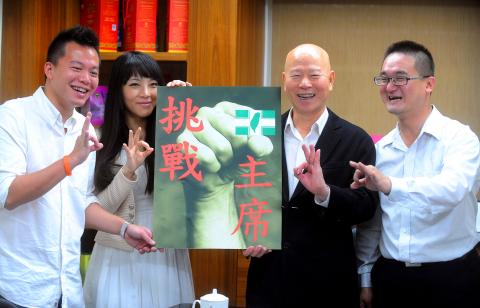The Democratic Progressive Party (DPP) would be prepared to seek active engagement with China, but would not change its policies to achieve that goal if he were elected party chairperson next month, former DPP chairperson Hsu Hsin-liang (許信良) said yesterday.
Hsu, one of five candidates running in the May 27 DPP chairperson election, focused on his China policy during a meeting with some of the party’s younger members yesterday.
“I would support the DPP’s engagement with Beijing and do not rule out visiting China myself, but I would not change our policies in order to make such a trip happen,” said the 70-year-old, who analysts consider the most moderate of the candidates in terms of China policy.

Photo: Wang Yi-sung, Taipei Times
Hsu said that he did not think it was necessary to rescind the Taiwanese independence clause in the party charter for engagement with Beijing, because “we can not deny our own history.”
“There is no such thing as abandoning Taiwanese independence. As Taiwan is now an independent country, how would we give it up? That’s simply impossible,” Hsu said, adding that he had always advocated a policy that “guarantees the political status quo before boldly opening up.”
However, the Taiwanese independence clause in the DPP charter could be replaced with a new resolution, he said.
Hsu said that former DPP chairperson Tsai Ing-wen’s (蔡英文) proposed China policy of “Taiwan is the Republic of China [ROC] and the ROC is Taiwan” would be a good place to start and could be drafted into an official document, to highlight the party’s recognition of the ROC political system.
However, Hsu said he favored the “constitutional consensus” advocated by former premier Frank Hsieh (謝長廷) over Tsai’s “Taiwan consensus,” because consensus on a constitution would incorporate a broader swathe of public opinion and therefore hopefully end internal division over Taiwanese identity.

Chinese spouse and influencer Guan Guan’s (關關) residency permit has been revoked for repeatedly posting pro-China videos that threaten national security, the National Immigration Agency confirmed today. Guan Guan has said many controversial statements in her videos posted to Douyin (抖音), including “the red flag will soon be painted all over Taiwan” and “Taiwan is an inseparable part of China,” and expressing hope for expedited reunification. The agency last year received multiple reports alleging that Guan Guan had advocated for armed reunification. After verifying the reports, the agency last month issued a notice requiring her to appear and explain her actions. Guan

GIVE AND TAKE: Blood demand continues to rise each year, while fewer young donors are available due to the nation’s falling birthrate, a doctor said Blood donors can redeem points earned from donations to obtain limited edition Formosan black bear travel mugs, the Kaohsiung Blood Center said yesterday, as it announced a goal of stocking 20,000 units of blood prior to the Lunar New Year. The last month of the lunar year is National Blood Donation Month, when local centers seek to stockpile blood for use during the Lunar New Year holiday. The blood demand in southern Taiwan — including Tainan and Kaohsiung, as well as Chiayi, Pingtung, Penghu and Taitung counties — is about 2,000 units per day, the center said. The donation campaign aims to boost

The Kaohsiung Tourism Bureau audited six hotels in an effort to prevent price gouging ahead of Korean band BTS’ concert tour in the city scheduled for Nov. 19, 21 and 22 this year. The bureau on Friday said that the audits — conducted in response to allegations of unfair pricing posted on social media — found no wrongdoing. These establishments included the local branches of Chateau de Chine, Hotel Nikko, My Humble House, and Grand Hai Lai, it said, adding that the Consumer Protection Commission would have penalized price gougers had the accusations been substantiated. The bureau said the Tourism Development Act

BACK TO WINTER: A strong continental cold air mass would move south on Tuesday next week, bringing colder temperatures to northern and central Taiwan A tropical depression east of the Philippines could soon be upgraded to be the first tropical storm of this year, the Central Weather Administration (CWA) said yesterday, adding that the next cold air mass is forecast to arrive on Monday next week. CWA forecaster Cheng Jie-ren (鄭傑仁) said the first tropical depression of this year is over waters east of the Philippines, about 1,867km southeast of Oluanpi (鵝鑾鼻), and could strengthen into Tropical Storm Nokaen by early today. The system is moving slowly from northwest to north, and is expected to remain east of the Philippines with little chance of affecting Taiwan,